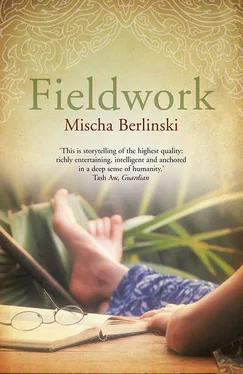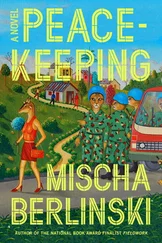No sooner had Martiya decided that the Dyalo were no more distant from her emotional experience than second cousins twice removed than they would present her with striking evidence to the contrary. It was late at night, and Martiya was lying on the hard floor of her thatch hut, when a loud scream pierced the wet night air, a repetitive throbbing moan that lasted upwards of a minute. She had been in the village several months. It was one of the eeriest noises Martiya had ever heard. She lay under her rough blanket, wondering whether she should investigate. The noise repeated itself a few minutes later, and Martiya asked herself: What would Malinowski do? She had almost convinced herself that Malinowski seemed the kind of man who valued his sleep, when the strange voice howled again. In the dark, she dressed herself, while the other occupants of the hut slept through the noise. With the aid of her flashlight, she wandered through the village. The dogs of the village barked as she passed. She found Vinai's hut and woke him from a deep sleep. Together, Martiya and Vinai traced the noise to a hut on the edge of the village. The hut was lit by a flickering yellow hurricane lamp. Vinai told Martiya to stay outside, and went inside; a moment later he came for her. She might watch, he said, as the shaman's demon rider came upon him.
The shaman was a middle-aged man, slightly stooped, with a distinguished face that resembled nothing so much as a very tanned and Asiatic version of the picture of George Washington on the dollar bill. (Martiya was so struck by the likeness that she had shown a few of the villagers the dollar bill. She was startled to discover, as the Walkers had discovered, that the Dyalo, who had no tradition at all of portraiture, had tremendous trouble interpreting the engraved image. They looked at the bill with no greater level of comprehension than if she had written down the binomial formula, and when she asked them, "Isn't it strange how the shaman looks like the headman of my country?" the villagers looked at her in a way that made it clear the dollar bill wasn't the only thing that was weird. After all, the shaman was so much larger . But the resemblance was clearly there: the high forehead, that distinguished Virginia jaw, even the jowls.) She had seen the man just a few day before, in the communal kitchen: he had smiled at her in a friendly, dignified, presidential way, had asked Vinai what she was doing here, and then ambled off.
But now he was transformed. He was sweaty, and his limbs — he was standing up — trembled. Martiya heard strange sounds coming from his throat, nothing like the gentle voice of the man she had met just recently. He made odd barking noises, and then again, that full-throated howl which had awakened and terrified her. It was as if a larger, clumsier creature had taken hold of his body and was now manipulating it. Martiya felt the hairs on her arms prickle. The shaman began to speak quickly in a voice a full octave deeper than the man's normal voice, and when Martiya asked what he was saying, Vinai responded in an apologetic hushed whisper that he did not know the shaman-talk. The spooky performance continued for almost an hour, until the shaman suddenly collapsed.
Of all the aspects of village life, just what happened to that man who in the daytime looked like a dead president and in the nighttime was a raving monster most aroused Martiya's curiosity. She wanted to know what had happened to him. She was in no position yet to answer the question, but the fact that she had a question that she was eager to answer was of tremendous psychological importance to her as she struggled with the language, the weather, the ubiquitous strangeness of the people, and particularly her host, whom she hated more intensely than any other human being since the sixth grade, when Alice Wilkerson put gum in her hair.
Not long after Farts-a-Lot vomited on her notebook, Martiya went to town to get her mail. This was something she did every couple of weeks. The Dyalo women, most of whom had only been out of the mountains once or twice in their lives, were stunned at Martiya's bravery, going into the lowlands like this by herself, and even the men, who regularly went down to the plains to buy bullets for their guns, or to sell corn, thought the nonchalant way that Martiya walked out of the village, carrying nothing with her but a small pack, an extraordinarily bold gesture: How did she know that she would find acceptable food and water down there? Lowland rice, the Dyalo felt, was gross, and murky lowland water unreliable. And how did she know that the spirits would be friendly the whole way?
The hike to the highway took Martiya a morning, but in the dry of the cool season, it was a pleasant jaunt. In the mists and fogs of the rainy season, the mountains had been claustrophobic, hemmed in by the gray; but now the skies were blue, and Martiya could see lime-green valleys and jagged hills as she walked, and then more hills beyond, and then, in the far distance, the broad plain of Chiang Rai, which stretched all the way to Burma. She passed through two villages, both Lahu, and by now she had been with the Dyalo long enough that she couldn't help but think as she saw the Lahu that they did look just a little like monkeys. The end of the rainy season brought more flowers into bloom than existed in the imagination of the most passionate English gardener: fields of wild roses and jasmine and day lilies, hyacinths and orchids curling off of every rotting log and tree. The villagers led water buffalo along the narrow trails, their hindquarters stained red with dust. Once she got down to the main road, she only had to wait a few minutes by the side of the road before a grizzled Thai farmer in a beat-up old pickup truck gave her a lift into town, and when she told him that she was living in a Dyalo village high in the hills, the farmer spat out the window and said, "Bah! You live with those animals?"
Martiya, as was her custom, spent the day in town. Even by Thai standards, it was a little place, nothing more than a post office, a market, a gas station, a noodle stall, a temple, and a few large concrete Chinese shop-houses — and yet, after Dan Loi, it felt like a metropolis. There was ice here, and Coca-Cola, and television. Motorcycles buzzed down the street, and music played on the radio. Martiya collected her mail and sat at the small restaurant on a real chair at a real table, and slowly went through the stack, letter by letter. Her father had written her a long letter describing the latest conference that he had attended — Piers van der Leun was a great lover of academic conferences, and spent a substantial portion of his time traveling from one to the next; and Joseph Atkinson, to tell her that he had received the carbon copies of her field notes, and in his opinion, she needed to consider spending more time in the fields. "Grab a hoe!" he wrote. Karen had written her a long, ecstatic gushing Karen-gram, consisting chiefly of a recital of the details of Karen's dreams. Her former landlady in Berkeley had forwarded a package of bills.
Martiya responded to all of the letters immediately, as she always did. She wrote to her father, telling him proudly how much progress she was making with the language. She wrote to Joseph Atkinson, telling him that the very last thing he ever wanted to see was her with a hoe— there was no saying in which of his orifices that implement might end up. She wrote to Karen, telling her all about her dreams. She'd had this one about being in San Francisco but everyone was speaking in Dyalo. Then she wrote a long description of her day, finishing with her sitting in a café in town responding to her correspondence. She was very nervous, she said, because she was about to take a huge risk with her fieldwork. The bills she ignored.
Читать дальше












